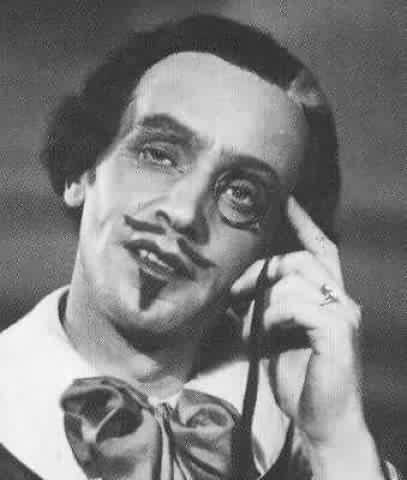|
|
|
 |
It seems strange now to think that, in the early 1930s, when the announcement was made "the part of the Duke of Plaza-Toro will be played at this performance by Martyn Green", there should have been a great murmur of disappointment from the audience. And yet how very quickly did Martyn Green capture all hearts and become one of D'Oyly Carte's greatest stars; he was a genius at the tongue-twisting patter songs (which of his fans can forget his modern Major-General or his Lord Chancellor's nightmare?!) and his Gondoliers gavotte brought forth encore after encore.
Martyn Green, born in 1899, first appeared for the "New" D'Oyly Carte Company as Luiz in November 1922. This was for the second Company, then known as the "New" Company. It was nearly two years later when he made his first appearance for the senior Company, then known as the Repertory Company. For about a year he divided his time between the two Companies, still playing mainly small parts such as Cox and Pish-Tush, with occasional principal roles for the New Company in the familiar comedian parts as understudy to Frank Steward. He became a regular member of the main company in July 1925, and first began at this period to understudy Sir Henry Lytton.
Normally he had a variety of small parts, including occasional appearances in such unlikely roles as the Usher and Giuseppe. He was also an occasional Florian in "Princess Ida".
In l928, by which time the New Company had disappeared and the principal Company had assumed its present name, the Company were playing a reduced repertoire, and it was at this point that Martyn took over the regular job of understudy to the comic roles played by Lytton. His appearances were limited until the tragic car accident which brought about the death of Bertha Lewis in May 1931. Sir Henry Lytton was injured in this, and during May and June Martyn appeared in no fewer than nine of his parts regularly. From this time on, even when Sir Henry returned, he assumed the parts of Major-General Stanley and Robin Oakapple. And he now began to be groomed for the job itself against the time, not now far distant, when his principal should retire.
Martyn Green became principal comedian in August 1934, and continued often playing ten principal roles, including John Wellington Wells in the rarely-performed Sorcerer, until the outbreak of the second World War in September 1939. During this time he established himself as a great favourite with audiences everywhere and he also appeared as Ko-Ko in the film of "The Mikado" made just before World War II (1938), during which he served in the R.A.F.
His father had been quite well known as a tenor singer, and Martyn, although a baritone, also had a very pleasant voice. But his greatest asset was his magnificent diction. I think it is fair to say that no D'Oyly Carte comedian, at any rate since 1919, has been clearer or more effective in style. He is also said to have begun the idea of climbing the curtains at the side of the stage when giving an encore.
In 1946 Martyn returned to give another five years' service, being everywhere received enthusiastically, before leaving, in 1951 to join an American company. In 1959 he faced, with great courage, the ordeal of having his left leg amputated, below the knee, when it was crushed in a New York lift accident on 7th November. The loss, though tragic enough - the amputation was performed under particularly agonising and primitive conditions-was not quite so bad as it might have been. During the first World War, at the age of nineteen, while serving in France with the Royal Fusiliers, Green had been badly wounded in the left leg by shrapnel and assured by the doctors that be would never walk again without crutches.
By means of dogged practice and exercise be eventually disposed of that prediction, but he was left with a serious difficulty: he could not put any weight on his left leg when the knee was bent. In his walking - and particularly in the marvelously agile dancing which was his speciality as Ko-Ko during his days with D'Oyly Carte - be trained his other muscles and his sense of balance to compensate for this handicap.
The leg he lost in the accident in 1959 was the bad one-one small mercy in an unfortunate business. But he made a good recovery and, equipped with an artificial limb, Green performed continually on the stage, on television, and in films, both in and out of Gilbert and Sullivan. Indeed, he was working in Chicago only a few weeks before his death on 8th February 1975.
He published a book of reminiscences, "Here's a How-De-Do" (Max Reinhardt), in 1952.
| Artist Index | Main Index |